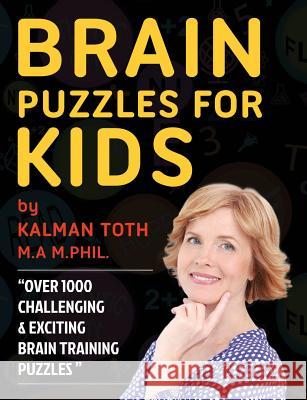Brain Puzzles For Kids » książka
Brain Puzzles For Kids
ISBN-13: 9781492340508 / Angielski / Miękka / 2013 / 502 str.
High IQ is essential for your child's future: school, college, career, professional & personal life. Discover the fun puzzles to increase IQ from kindergarten to any age. The following puzzle types are presented: WORD SQUARE (SPELLING FUN) 4X4 SUDOKU (LOGIC) CALCULATIONAL (MATH FUN) PICTURE PUZZLE (VISUAL INTELLIGENCE)WORD REARRANGEMENT (VOCABULARY FUN)MULTIPLE OPERATIONS ( MATH CHALLENGE) 9X9 SUDOKU (LOGIC CHALLENGE) MISSING LETTERS (SPELLING CHALLENGE) SINGLE WORD ANAGRAMS (LANGUAGE FUN) SINGLE WORD REVERSGRAMS ( LANGUAGE) ROAD SIGNS PUZZLE (GEO INTELLIGENCE) WORD SEARCH (SPELLING FUN) MATRIX PUZZLE (MATH FUN) WORD SNAKE (VOCABULARY FUN) SOLUTIONS ARE PROVIDED FOR ALL PUZZLES. Puzzles are fun & entertaining for all ages. Children do not realize while they are working puzzles that they are learning thinking skills that will help them the rest of their lives. Young children have brains that can learn new skills and acquire knowledge very quickly. They can even learn highly complex activities relatively easily. This ability to learn quickly and permanently makes their early years an ideal opportunity for mastering puzzle solving skills, improving thinking, and, yes, even increasing effective IQ While God-given IQ cannot be increased, effective (what we actually use) IQ can. A typical adult person may only use 100-120 effective IQ from the God-given IQ of 150. If your child initially needs assistance to complete some puzzles, that is okay. Keeping in mind the type of puzzle they are attempting, you can direct them to use the following methods: 1.Suggest to your child that they answer the ones they know first. 2.Encourage your child to work in sections. 3.Remind your child they are using a pencil so that they can erase wrong answers. Help them understand that trying an answer that may not work is all right. 4.You may wish to supply a hint if necessary. 5.Try working the puzzle with them as a cooperative effort. Why should children do puzzles? Puzzles positively affect the brain. The brain changes as we grow. Scientists have found that the brain actually reorganizes itself in response to new challenges, and a puzzle provides a challenge for a young child. In addition, puzzles are good for your child's mind and cognitive (thinking development). In fact, psychologists have determined that a child's brain development is influenced significantly when a child is able to manipulate outcomes. Puzzles allow this manipulation. Puzzles also improve focus and attention as your child looks for solutions. Finding solutions requires a certain amount of solitude without distraction. Concentrated attention is an excellent skill to develop that will add your child in cooperative learning environments. Puzzles have been proven to stimulate memory. When your child tries a possible solution and it does not work, they need to remember the wrong attempt so that they do not retry a wrong answer. Puzzles increase IQ. Intelligence Quotient - IQ - is a scientific assessment of an individual's intelligence. A child's IQ is derived from measuring problem solving abilities, memory, general knowledge, and spatial imagery. Recent studies have shown that it is possible to increase intelligence. Children who do mental workouts, such as puzzles, have higher IQs than who do not. This is because puzzles help stimulate brain thinking, memory, and brain activity. Puzzles teach problem-solving skills. Playing puzzles affects the thinking side of a child's brain, which forces a child to solve problems logically. The skill of effective problem solving is a valuable and important one. A puzzle cannot be completed by cheating An answer either works and fits or it does not. Therefore, puzzles teach your child to use their own minds to figure out how to think in a logical way to solve problems. Children who are good at puzzles will increase their ability to gather information, assess a situation, and find a quick solution to a pro
Zawartość książki może nie spełniać oczekiwań – reklamacje nie obejmują treści, która mogła nie być redakcyjnie ani merytorycznie opracowana.











